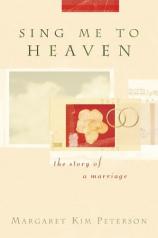Sing Me to Heaven: The Story of a Marriage
Review
Sing Me to Heaven: The Story of a Marriage
Falling in love with Hyung Goo Kim was the best and worst thing that ever happened to Margaret Kim Peterson. In her recently published memoir SING ME TO HEAVEN: The Story of a Marriage, Peterson does an exquisite job of explaining how both were true.
The short explanation is to say that Hyung Goo was HIV-positive. This revelation while the couple was dating threatened to dissolve their burgeoning romance for reasons that are all-too-obvious. But it was a combination of not-so-obvious reasons that ultimately brought the two together in marriage.
"I wanted so desperately to know and be known, to love and be loved, and I had never met anyone with whom that seemed like the remotest possibility. I could sense that possibility already welling around the two of us. To have said to him at that point, 'I'm sorry; would you please go away' would have felt like cutting off my arm. I just couldn't do it."
Hyung Goo's HIV-positive status accounts for the worst part of falling in love with him. With heartbreaking detail, Peterson recounts their collective descent into the hell of hospitals and medicines and painful physical deterioration when Hyung Goo officially contracted AIDS and he began his halting march towards death. This aspect of the story alone is an incredibly valuable inside look at the real work of dying with a terminal illness.
But HIV also plays an unexpectedly large role in the best part of falling in love with Hyung Goo:
"We began to see only gradually and toward the end of Hyung Goo's life the ways in which the present and anticipated grief of our marriage had contributed to the richness of our life together. The sorrows of our life had not simply detracted from our happiness, but had shaped and even contributed to that happiness. In the Spring of 1995, it was becoming clear that Hyung Goo was not going to live much longer --- maybe a year, probably less. In the midst of his worsening illness, he and I were coping together in much more cooperative and mutually supportive ways than in former days. 'It really is remarkable how far you two have come in just four years,' Martha commented to me.
She was right; but I wanted more. Where might we have been in ten years, if we had them?
'It's fruitless to ask that question,' Martha said. 'If you had ever thought you had that kind of time, you wouldn't be where you are now.'
It was impossible to see AIDS itself as good. But it was equally impossible to see that the particular good Hyung Goo and I had experienced together in the midst of AIDS could have been obtained in any other way. The requiem that we sang for one another and with one another was not something external to our marriage, like a piece of black crape draped over the frame of an otherwise sunny and cheerful picture. Our individual and shared sorrows were part of the picture itself, shadows without which the picture and its characteristic beauty would have been, if not gone, than at least altered beyond recognition."
Peterson's narrative provides an intimate and moving look at a marriage in which the looming specter of death brings present joy, love and sustaining faith into sharp relief. The couple ate dinner off their fine china every day at a table cluttered with hundreds, if not thousands, of pills and medicine bottles, reminding them why the special plates shouldn't be reserved for future occasions.
Listening to the Margaret of today reflect upon the Margaret of yesterday, it is clear Hyung Goo left her with the invaluable gift of an inculcated sense of self and stability. Indeed, the deeply therapeutic nature of this marriage is one of its most notable aspects:
"We were both looking for a love affair when we began our courtship. We wanted affection and companionship and romance and we got them; but we got something far deeper and more transformative as well ... Like Max in WHERE THE WILD THINGS ARE, Hyung Goo wanted most just to be where someone loved him best of all. In our marriage he found that place. I couldn't have loved him more if there had been ten of me. And the more I loved him, and the more I relaxed into his love for me, the more worthwhile and competent he felt; until in the last year of his life he had settled into a confident, gentle, joyful, sense of himself as a man and as a husband."
There are love stories and then there are love stories. The former are as pleasant as they are predictable and they tend to be thoroughly forgettable. The latter earn their italics with uniquely honest depictions of the predicament of being in love. These tales have the ability to transcend their specifics to address larger issues of what it means to be human, and they have the uncanny ability to take up residence in the mind (and heart) of their readers. SING ME TO HEAVEN is a love story with italics.
Reviewed by Lisa Ann Cockrel on August 1, 2003
Sing Me to Heaven: The Story of a Marriage
- Publication Date: August 1, 2003
- Genres: Christian
- Hardcover: 221 pages
- Publisher: Brazos Press
- ISBN-10: 1587430479
- ISBN-13: 9781587430473



